Promotion/Relegation
Is it time to promote programs based on something other than enrollment?
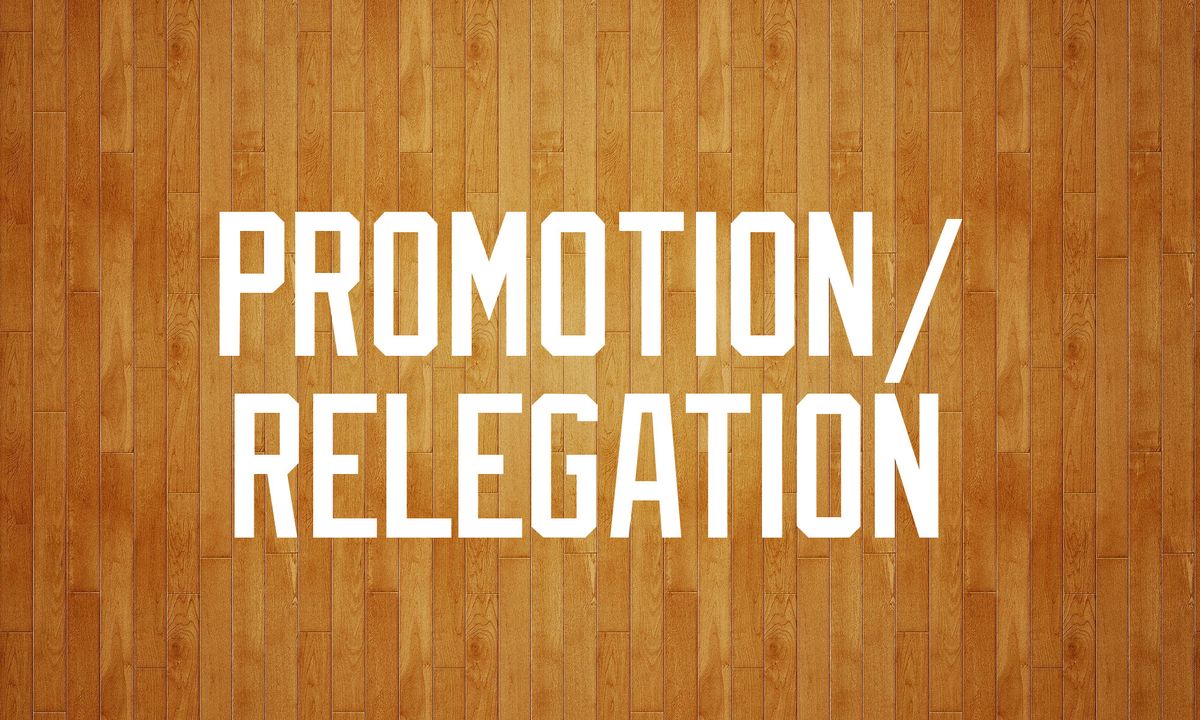
As fall sports wind down and some Gold Balls go to dominant programs that won last year (and in 2019 and in 2018 and in 2017 and in 2016) the chatter across the state turns back to competitive balance.
It's one thing to be the Skowhegan field hockey team winning 17 titles in 21 years. They play at the state's highest level and we can't exactly ship them to New York or make them play against college teams. But winning 7 of the last 8 Gold Balls in Class B soccer? Winning 14 consecutive State Titles in Class C tennis?

If you win 14 straight titles, you're on too easy a level. No one is impressed. You aren't Bill Russell. Turn the settings up. Quit playing against your little brother and go find some competition.
A program should petition up long before they win their 14th straight championship. But if we've learned one thing over the last couple of years, it's that some people won't do the right thing. Ever. They don't care. They're going to put more hardware in the trophy case, ethics be damned. Which is why it's imperative that the MPA step in and make them do the right thing. After all, that is quite literally their job--to be the adult in the room.
People can (and will) argue all day about whether the issue is recruitment or facility access or AAU programs or number of McDonald's per capita or even the percentage of students on free lunch, but none of that really matters. If you're dominating a level, you should move up.
A season of high school sports shouldn't exist where only 2 or 3 teams have a chance to win it all. And it should never extend beyond a couple of seasons. If it does, a lot of adults have failed.
The MPA, like most states, currently assigns schools to classes based on enrollment numbers. It’s the simplest method, even though we already know that enrollment numbers don’t correlate to success and are a mediocre system for obtaining any level of competitive balance. There’s just so many more factors in play. Some schools are basketball schools. Some are soccer schools. Some are wrestling schools. A private school is more likely to be able to bring in an athlete from “away” whereas a public school is largely bound by who lives in their district. But even that isn’t a great indicator. There are private schools with dorms that have mediocre sports programs and are routinely trounced by their public school neighbors. In fact, there’s really only one reliable indicator of how good a team will be: the history of the program.
I tend to think of the basketball programs as fitting into a couple of buckets: the yearly contenders, the middle of the pack, and the consistently mediocre. The yearly contenders are the teams that are always in the mix: MDI, Hermon, Greely, Falmouth, Hampden, Forest Hills, Winthrop, etc. We all know the list. A bad year for these programs is 10 wins. The middle of the pack programs will sometimes get up to the 1 seed, but are usually in the 4-10 range. When they get a strong class, they can make a run at a Gold Ball, but if they get to 2 Regional Finals games in 10 years, they’re very happy. They’ll probably miss the tournament entirely every couple of years. The final group of programs is schools that aspire to a play-in game. It’s not unusual for them to go 3-15 or 2-16. Sometimes, those schools will find lightning in a bottle and make a run, but they’ll usually drop back out of the tournament when that class graduates.
There’s sub-groups to this, but you get the idea.
The middle of the pack programs, you can easily classify them by enrollment and it’ll work fine. They’ll have good years and bad years and be generally competitive. But the other two groups? That’s where the idea of promotion and relegation comes into play.
The Premier League Method
You’re probably already familiar with how this works across the pond. In UK football, there’s 9 levels, starting with the Premier League and going all the way down to semi-pro clubs. The criteria for promotion isn’t exactly uniform, but essentially the top 2 or three in each tier are promoted and the bottom 3 or four are relegated and move down a level.
If you’ve watched the show Welcome to Wrexham, you know that promotion is something teams aspire to, rather than avoiding because their success is being “punished”. Of course, there’s a financial component that we can’t replicate. But there's also a pride component. It's an achievement.
You should want to challenge yourself.
In theory, the Premier League method sounds great, but I suspect it might be excessive for our needs.
The glaring issue is that if you do everything on the current 2 year cycle, how do you determine who the "best" team is? And if you were to do it on a yearly basis, what happens when the 4 seed that went 12-6 gets hot and wins a Gold Ball? Do you really want them getting promoted? What happens in a region where there isn't a team that needs to be moved up?
I don't think this method will work.
The Indiana Method
To the surprise of no one, Indiana is light years ahead of Maine when it comes to high school basketball. They have a variant on promotion called a "Tournament Success Factor" where teams accumulate points based on their post season play. A Gold Ball is worth 4 points. A Semi-State Championship is worth 3. A Regional Championship is worth 2 and a Sectional Championship is worth 1. If you get 6 points in a 2-year cycle, you’re promoted to the next level. Simple as that.
And in the next cycle, if you fail to earn a point, you move back down. Sectionals are 5-7 schools of your size near you, so if you have 2 shots to win at least that to stay.
There’s a lot to like about this. You earn the ability to play on a bigger stage! You don’t get stuck there for a long time if it doesn’t work! But I think it has flaws.
The Problem with the 2 Year Cycle
Remember the buckets? The problem with Indiana’s system becomes evident when you look at that middle of the pack bucket.
Let’s as an example the Nokomis boys, which is an extreme case that does a good job of illustrating the issue.
Here’s the last 8 years for Nokomis, pre-COVID:
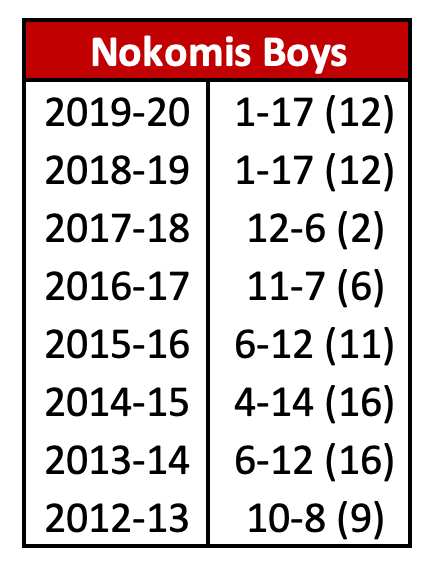
That’s your standard middle of the pack program, albeit one on the lower end of the spectrum. Then we all know what happened last year.
The problem is that with on a 2 year cycle with a standard relegation, those consecutive 1-17 seasons would have dropped them to B just in time for the Flagg twins to show up. We can assume they win the B title as well and then very likely would have been promoted to A. Had they stayed for 4 years, Nokomis probably gets promoted to AA after their senior years. After that? The generational talents are gone and one of the smallest class A programs is trying to hold their own in AA. That's just a lot of needless movement.
Contrast that with Hampden:
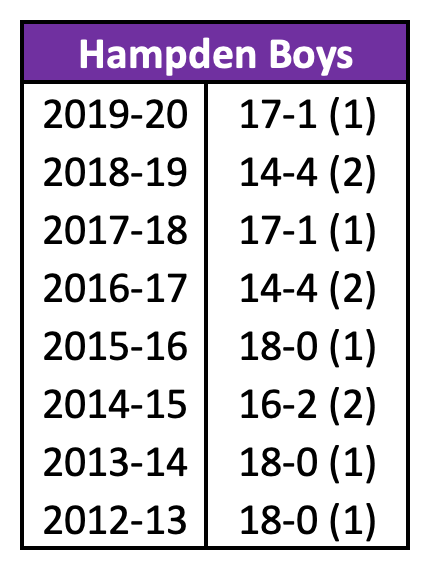
When your worst season in 8 years is the 2 seed and you've got 3 Gold Balls and 5 Regional Titles, it's time to move up.
Hampden has been an obvious candidate for promotion for a long time. Everyone knew they should have been in the initial batch of AA schools when we went to 5 classes, but they went to A because of their enrollment numbers. When they finally went up, it wasn't because of any competitive reason. It was because they added 31 students in 2 years and went over the 800 student cutoff for AA. They now have 801. Hope that extra kid likes basketball.
The 6 Year Method
Indiana’s system of points is a good start. There should be a set criteria based on success instead of just promoting the top team or waiting for enrollment to rise. If you hit a certain benchmark, you automatically go up. No appeals. No arguing.
We could use a variant on Indiana’s system that looks something like this:
Gold Ball: 4 points
Regional Title: 3 points
Regional Runner-up: 2 points
Make it to Augusta/Bangor/Portland: 1 point
I did a quick survey of (nearly) every school in classes A-D that's been to 2 or more state games in the 6 seasons pre-COVID. Apologies to Maranacook and anyone else I left out. I also made the assumption that these teams all made the tournament every year, even though some didn't.
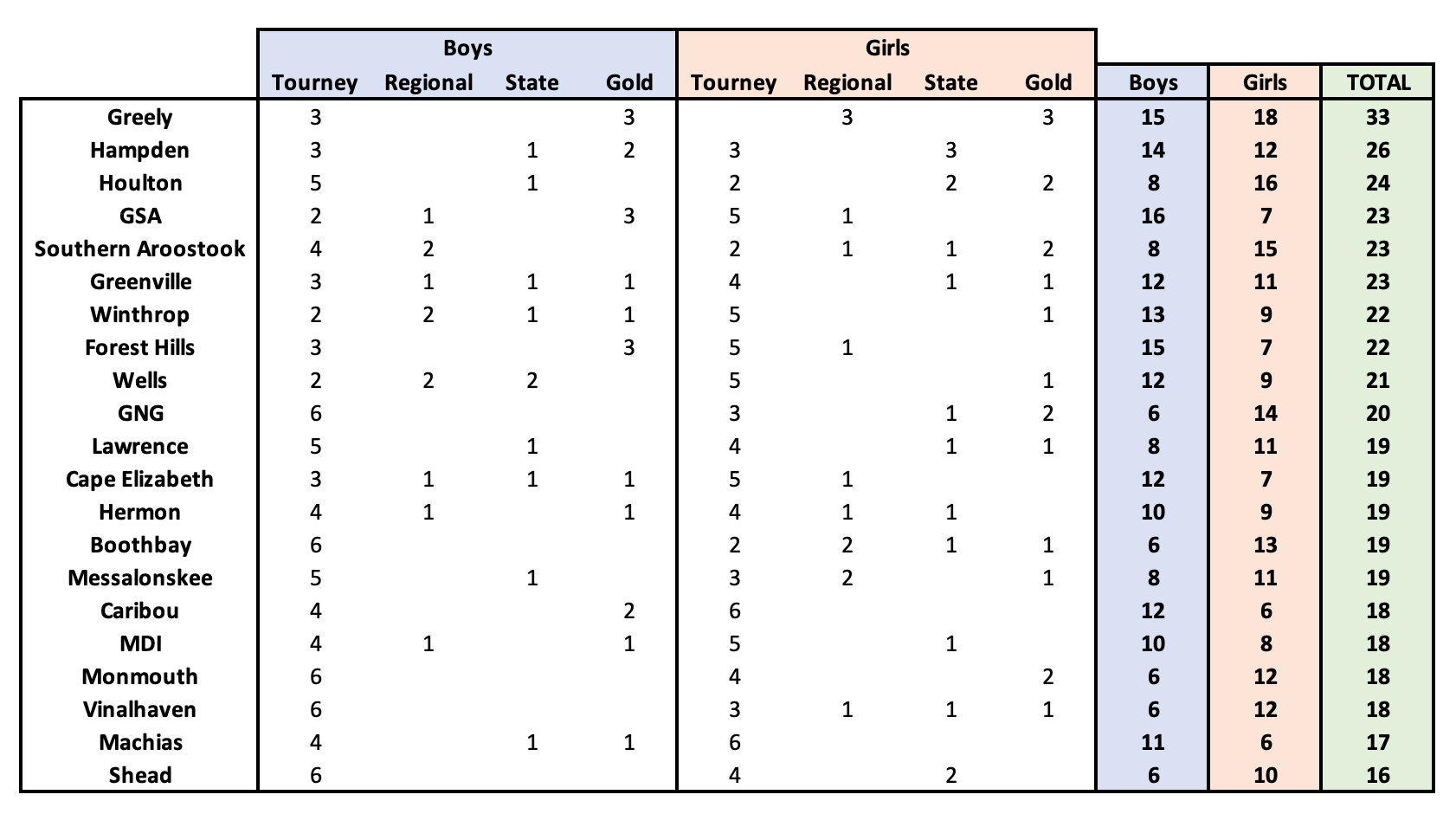
If you're wondering, Greely needs to add 165 students before they'll get moved up to AA. That's a North Yarmouth Academy. They are the 13th largest Class A school, but they seem to be doing ok.
Based on this, it seems like the line should be around 15 points for a team or 25 points for a school. That's a total of 8 teams in the entire state that should be promoted (6 if you don't include Hampden).
But how could you split up the boys and girls programs? Think of the schedules! Oh the humanity!
I'd be willing to wager quite a bit of money that a program of this caliber will find a way to play a schedule that makes them as competitive as possible. Most of these schools already play games against the schools in the class above them. Greely routinely does (and usually wins). Hell, there's a number of schools that are already playing a schedule full of teams in the class below theirs because their conference requires it.
You could modify this to include Regular Season wins. Say, 200 combined wins in 6 years and you move up. Or you could weigh postseason wins higher or use total Heal Points or do total wins with championship bonuses. The point is there’s a dozen ways to do it, but 6 years assures a team has some lasting success that will likely be maintained at the higher level.
Relegation
In Indiana, when a team moves up, another team must move down, in order to maintain the balance, but the MPA has shown it doesn't care about balance, so it's less of a concern.
What should be a concern is setting up a similar system where teams that are unable to compete at their current level are sent down.
are also struggling programs in larger classes that are better than the majority of the teams in the state. Why continue to make them go 1-13 every year when they could go to B, develop a winning culture, potentially even win a championship, and then the state has another -
— Griffin T Conlogue (@_GC93) November 6, 2022
Griffin is talking about soccer, but the point holds.
I'll leave the teams out of it, but who exactly does this benefit?
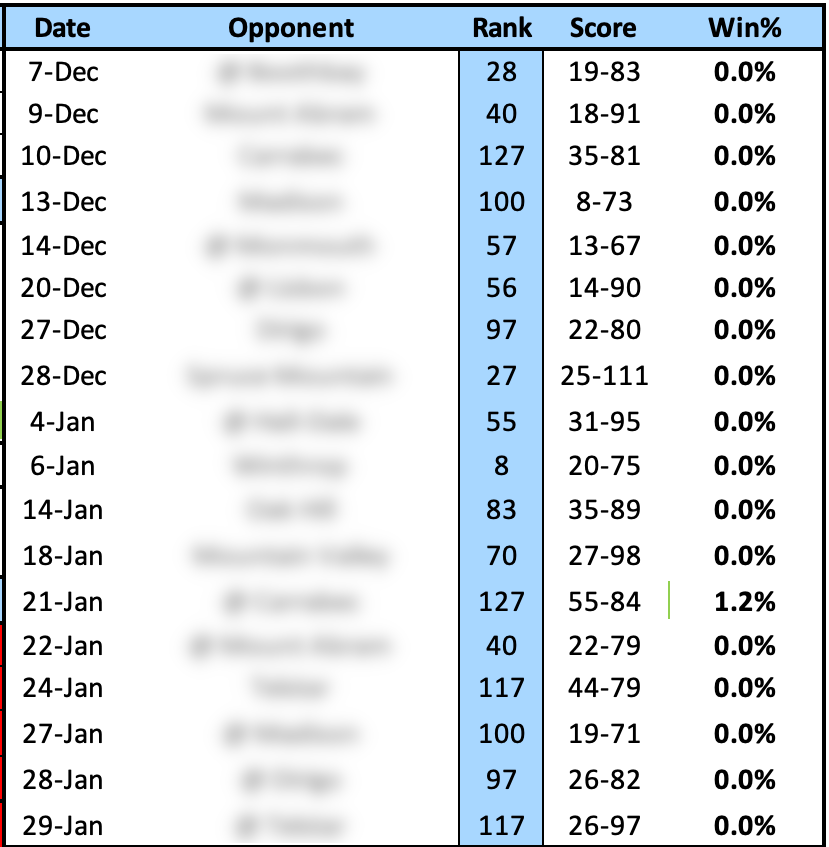
Would you want to play on this team? Would you want your kid to play on this team?
In the same way that we need a benchmark by which a team is promoted, we should have one where they are relegated. And not relegated with some nonsense penalty that they're ineligible for the tournament. Do you really think this team is going to drop down a class and suddenly win a Gold Ball? Why do we constantly feel the need to punish kids for the failures of adults?
I'd propose a benchmark that works on a shorter timeline, as there's no risk of a uniquely talented athlete skewing the results. This could be as short as 2 or 4 years and could be done with simple wins. Fewer than, say, 3 wins in 2 years or 5 in 4 and you're a candidate to be sent down. Although, with this I wouldn't make it automatic. Let's go back to Nokomis. They had back-to-back 1-17 seasons and would be a candidate for relegation, but everyone knew they had talent on the way, so relegation wouldn't be appropriate. Similarly, the Cony girls several years ago had a season where I think they only won 1 game, but they were very young and competitive.
Relegation should be reserved for cases where a team doesn't have a prayer, not just a down cycle. But it should absolutely be on the table. Do we really need to sentence kids to 4 years of 1-17 seasons because of where their parents happen to live? Move them down and let them play competitive basketball. Let them feel what it's like to play on those tournament floors, to play for something meaningful instead of trying to hold their own against the other team's JV players.
I was a fan for many years. I ran a club, and one thing I’ve known, I’ve been convinced of, is that every fan has to have hope and faith. If you remove hope and faith from the mind of a fan, you destroy the fabric of the sport. It’s my job to restore it.”
– Bud Selig, in a Q&A from January 2000
When a team in your region has won 14 straight titles, there's no hope and faith. When you're getting outscored by 60 points a game, there's no hope and faith.
The MPA has a number of well-paid employees and their job is create and maintain a level playing field for high school athletics in the state of Maine. That's pretty much it. So to allow a situation where a team has won 14 consecutive titles is a dereliction of duty. Their job--their taxpayer funded job–is to make sure that doesn't happen. Implementing a system like this where teams can be promoted and relegated under reasonable benchmarks would go a long way toward that goal.


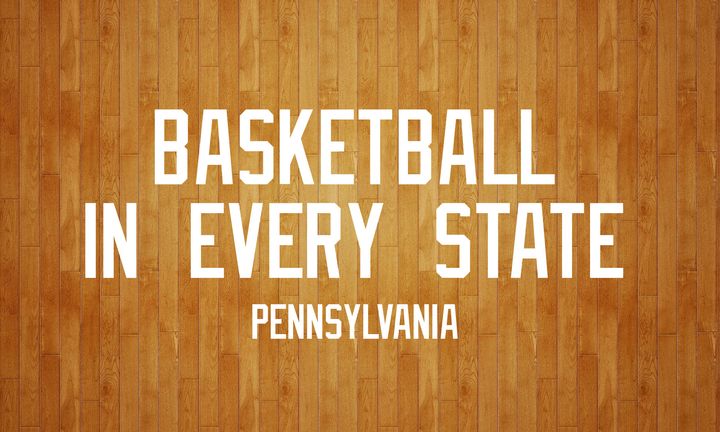
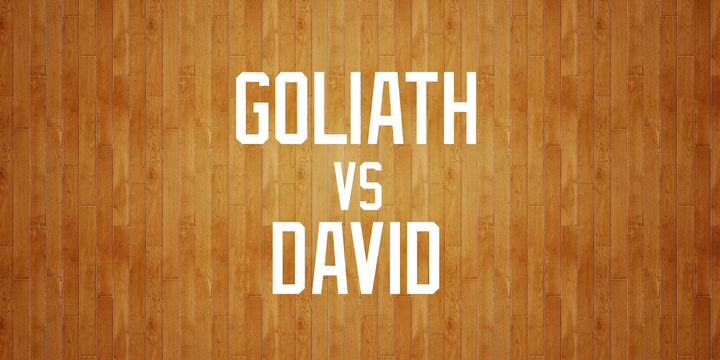
Comments ()